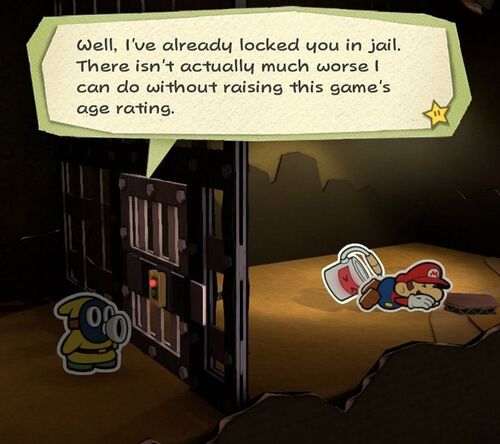The official discord link if you wish to join the discord: https://discord.gg/j5RKwCvAFu
Support the wiki on our official Ko-Fi page or Patreon page!
Breaking the Fourth Wall: Difference between revisions
m |
m |
||
| Line 2: | Line 2: | ||
== | == Background == | ||
'''The 4th Wall''' is a literary term that originates from stage plays. Typically, a stage would be rectangular, so there would be 3 walls, one in the back, and 2 on the sides. The "4th wall" would be the edge of the stage that faces the audience. Obviously, there was no actual wall there. The term 4th Wall refers to the barrier between the audience of a work of fiction and the fictional universe itself. In most works of fiction, the 4th wall is intact, that is, the characters do not acknowledge the existence of an audience or that they themselves are part of a fictional work. However, some fictions employ the literary technique of Breaking the 4th Wall. This includes talking to the audience, affecting the "real world", rewriting speech bubbles, acknowledging that they are part of a fictional world, and even leaving the fictional work itself and entering the "real world" (represented, obviously, by a fictionalized version of the real world). It is one of the most versatile abilities out there. | '''The 4th Wall''' is a literary term that originates from stage plays. Typically, a stage would be rectangular, so there would be 3 walls, one in the back, and 2 on the sides. The "4th wall" would be the edge of the stage that faces the audience. Obviously, there was no actual wall there. The term 4th Wall refers to the barrier between the audience of a work of fiction and the fictional universe itself. In most works of fiction, the 4th wall is intact, that is, the characters do not acknowledge the existence of an audience or that they themselves are part of a fictional work. However, some fictions employ the literary technique of Breaking the 4th Wall. This includes talking to the audience, affecting the "real world", rewriting speech bubbles, acknowledging that they are part of a fictional world, and even leaving the fictional work itself and entering the "real world" (represented, obviously, by a fictionalized version of the real world). It is one of the most versatile abilities out there. | ||
Latest revision as of 06:49, 31 December 2024

Background
The 4th Wall is a literary term that originates from stage plays. Typically, a stage would be rectangular, so there would be 3 walls, one in the back, and 2 on the sides. The "4th wall" would be the edge of the stage that faces the audience. Obviously, there was no actual wall there. The term 4th Wall refers to the barrier between the audience of a work of fiction and the fictional universe itself. In most works of fiction, the 4th wall is intact, that is, the characters do not acknowledge the existence of an audience or that they themselves are part of a fictional work. However, some fictions employ the literary technique of Breaking the 4th Wall. This includes talking to the audience, affecting the "real world", rewriting speech bubbles, acknowledging that they are part of a fictional world, and even leaving the fictional work itself and entering the "real world" (represented, obviously, by a fictionalized version of the real world). It is one of the most versatile abilities out there.
Possible Use
- 4th Wall Awareness: The user is aware that his/her universe is a fictional/false one, allowing them to carry out acts that, within the universe, would otherwise be impossible.
- 4th Wall Interaction: The user can interact and even affect the real world from inside a fictional universe, allowing them to control and even change what happens to the reality that created the character.
- 4th Wall Breaching: The user is not only aware of the real world from their fictional world and able to interact with it, but can also leave the fiction they hail to enter the real world and interact with it.
Users
- Chowder (Chowder)
- Flumpty Bumpty (One Night at Flumpty's)
